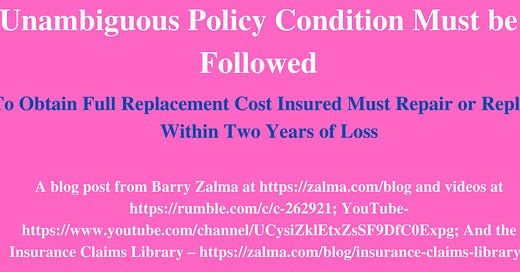Unambiguous Policy Condition Must be Followed
To Obtain Full Replacement Cost Insured Must Repair or Replace Within Two Years of Loss
Read the full article at https://www.linkedin.com/pulse/unambiguous-policy-condition-must-followed-barry-zalma-esq-cfe and at https://zalma.com/blog plus more than 3900 posts. Posted on October 5, 2021 by Barry Zalma
Railroad Avenue Properties, LLC (“Railroad Avenue”) sued Acadia Insurance Company (“Acadia”) for breach of contract. The dispute concerned the amount of insurance coverage available under a commercial property insurance policy for damages sustained by a fire at 11 Railroad Avenue. In Railroad Avenue Properties, LLC v. Acadia Insurance Company, C. A. No. 19-40155-TSH, United States District Court, D. Massachusetts (September 29, 2021) the court ruled on Acadia’s Motion for Summary Judgment.
Acadia insured the property and adjusted and paid for damage arising out of the fire loss. Acadia argued that it had no obligation to pay Railroad Avenue for the difference between the replacement and actual cash value for any property loss or damage because the property was not repaired or replaced within two years after the loss, as it set forth in the Policy
RELEVANT POLICY PROVISIONS
The Policy provides “We will not pay on a replacement cost basis for any loss or damage: (1) Until the lost or damaged property is actually repaired or replaced: (a) On the described premises; or (b) At some other location in the Commonwealth of Massachusetts; and (2) Unless the repairs or replacement are made within a reasonable time, but no more than 2 years after the loss or damage.”
Findings of Fact
Acadia issued a Businessowners Policy, providing insurance coverage to Railroad Avenue in the event of various casualties, including loss due to fire. On November 18, 2017, the Property sustained severe damage from a fire. Given the extent of the damage, the building was determined to be a total loss and would require a rebuild.
Acadia was notified promptly. The Fire Loss was caused by an unidentified arsonist. Railroad’s public adjuster agreed with Acadia’s estimate to replace the structure but reserved the right to seek an additional $25,000 in ordinance or law coverage arising out of the anticipated need to install sprinklers when the building was rebuilt.
After the fire, Railroad hired a contractor, RGN Construction Management, LLC, (“RGN”) to design and construct a replacement building.
On February 22, 2018, Acadia received a Proof of Loss executed by Railroad Avenue. The Proof of Loss indicated that: (a) the Replacement Cost Value of Repair (excluding the potential $25,000 code claim) was $808,468.13; (b) the Actual Cash Value was $610,928.46; and, (c) after deducting the deductible amount ($10,000) and the advance payment ($25,000), the net Actual Cash Value was $575,539.67.
Christopher Redmond inspected the Property on September 27, 2018. Redmond observed that the subject building had been razed, all debris had been removed from the premises, but there was no indication that any reconstruction had begun. Railroad Avenue requested a six-month extension on November 5, 2019, about two weeks before the two-year anniversary of the fire, stating that construction would done in four months. Acadia did not grant an extension to the two-year rebuild requirement under the Policy.
Legal Standard
In deciding a case on summary judgment, the Court views the facts in the light most favorable to the non-moving party and makes all reasonable inferences in that party’s favor. Once the moving party shows the absence of any disputed material fact, the burden shifts to the non-moving party to place at least one material fact into dispute.
Under Massachusetts law, the interpretation of an insurance contract is a question of law.
DISCUSSION
Railroad Avenue claims that it was entitled to the replacement cost to repair and/or replace the Property and seeks to recover the difference between the replacement cost and the ACV. Railroad Avenue also asserts that it is entitled to payment under the Ordinance or Law provision of the Policy which entitles it to recover increased costs incurred in connection with the repair and replacement of damaged property to bring the repaired/replaced property into minimum compliance with building, zoning or land use ordinance or law (here, a sprinkler system).
Acadia contends that the clear and unambiguous language of the Policy provides that the Railroad Avenue is not entitled to replacement cost or ordinance cost unless the damaged property is repaired or replaced within two years of the date of loss. Because it is undisputed that Railroad Avenue did not repair or replace the Property within two years of the date of loss, Acadia argues that Railroad Avenue was not entitled to recover replacement cost or ordnance cost.
The plain language in the Policy provides that Railroad Avenue is not entitled to recover replacement or ordinance cost under the Policy until the damaged property is actually repaired or replaced. Moreover, such repairs or replacement were to be made as soon as reasonably possible and must have been completed within two years of the date of loss.
The requirement that the damaged property be repaired or replaced is a condition precedent to the insured being entitled to replacement cost and ordinance cost proceeds. That is, the insurer is not liable to pay either replacement or ordinance unless and until the insured has met all necessary conditions, i.e., repaired or replaced the damaged property. If the time by which the condition must be fulfilled ends the condition remains unsatisfied, the obligor’s duty is discharged unless the obligor excuses fulfillment of the condition.
Replacement cost coverage is not triggered until the damaged property has actually been “repaired or replaced” by Railroad Avenue, and is only available if Railroad Avenue makes such repairs or replacement “within a reasonable time, but no more than 2 years after the loss or damage.”
Railroad Avenue argues that the condition was satisfied because it intended to rebuild, was in the process of rebuilding, others caused delays, and because it had executed construction contracts within two years of the loss,
Performance of the condition precedent was not excused. Therefore, Railroad Avenue is left to argue that Acadia breached its obligations under the Policy and prevented the condition precedent from being met. Moreover, the burden of proof is on Railroad Avenue to establish that Acadia prevented it from complying with the condition that that the damaged Property be repaired and replaced within two years of the Loss. The undisputed evidence establishes that Acadia acted promptly in investigating the loss, providing its estimate and paying the claim. Defendant’s Motion for Summary Judgment was granted.
ZALMA OPINION
The District Court applied the clear and unambiguous language of the policy. The insured failed to repair. In fact all they did in the two years after the loss was demolish the fire damaged structure. They asked for an extension of the deadline only two weeks before it expired which request was denied and the condition precedent applied. Insurance is a contract and if its conditions are clear and unambiguous they must be applied if not excused.
© 2021 – Barry Zalma
Barry Zalma, Esq., CFE, now limits his practice to service as an insurance consultant specializing in insurance coverage, insurance claims handling, insurance bad faith and insurance fraud almost equally for insurers and policyholders.
He also serves as an arbitrator or mediator for insurance related disputes. He practiced law in California for more than 44 years as an insurance coverage and claims handling lawyer and more than 54 years in the insurance business.
He is available at https://www.zalma.com and zalma@zalma.com. Mr. Zalma is the first recipient of the first annual Claims Magazine/ACE Legend Award. Over the last 53 years Barry Zalma has dedicated his life to insurance, insurance claims and the need to defeat insurance fraud. He has created the following library of books and other materials to make it possible for insurers and their claims staff to become insurance claims professionals.
Go to my articles at https://zalma.substack.com, the podcast Zalma On Insurance at https://anchor.fm/barry-zalma; Follow Mr. Zalma on Twitter at https://twitter.com/bzalma; Go to Barry Zalma videos at https://www.rumble.com/zalma ; Go to Barry Zalma on YouTube- https://www.youtube.com/channel/UCysiZklEtxZsSF9DfC0Expg; Go to the Insurance Claims Library – https://zalma.com/blog/insurance-claims-library/ The last two issues of ZIFL are available at https://zalma.com/zalmas-insurance-fraud-letter-2/ podcast now available at https://podcasts.apple.com/us/podcast/zalma-on-insurance/id1509583809?uo=4






